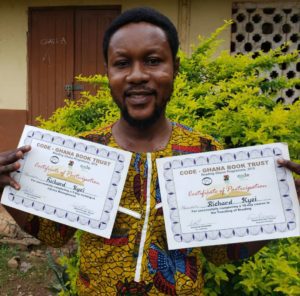It’s not easy to be a teacher in rural Ghana. In your big city teachers’ colleges, you have libraries full of books, steady electricity supply, decent WiFi and you are surrounded by people who believe in the power of education to change lives.
But in Adubia, approximately 80 kilometres from Kumasi on a bumpy road, it’s a different world. The schools here have no libraries and what books there are, are outdated textbooks. Most of the time there is electricity but there is no WiFi and only the lucky few have laptops or even smart phones. People here don’t put their hope in education as much as they do in striking it rich with “gelamsey” – small-scale mining.
Richard Kyei is the head teacher at the Adubia Primary School in Amansie South District. His father wanted him to be an accountant, but Richard’s passion for teaching was undeniable. His father gave in and sent him to teachers’ college. Prior to becoming a head teacher, Richard taught grade 6 for seven years doing his best to prepare his students to transition to junior high school. He often used his own money to buy needed learning materials and supplies for the classroom.
In 2016, he was invited to a meeting at the school to hear about a new program called Reading Ghana. Representatives from the Ghana Education Service and Ghana Book Trust described the program that would include an opportunity for professional development – an opportunity that is very rare once teachers leave college and start their careers. As a grade 6 teacher, Richard was chosen to attend the workshops. He says the workshop changed his approach to teaching and the trajectory of his career. Along with the workshops, books were given to each school and used in so many ways including reading competitions – that motivated the students and attracted community members to come and see what they were learning.
 “We were taught strategies on how to make our lessons learner-centered. That means students are engaged in learning activities where the students bring their experiences and what they already know to the learning process. In this approach, children speak up and share their ideas, not just listen to a teacher give them information. The parents were very happy. We heard from them that their children had improved in their verbal skills, their vocabulary, and their ability to think. Many children discovered a new enjoyment – reading (the books provided by the program). Academic performance improved too.”
“We were taught strategies on how to make our lessons learner-centered. That means students are engaged in learning activities where the students bring their experiences and what they already know to the learning process. In this approach, children speak up and share their ideas, not just listen to a teacher give them information. The parents were very happy. We heard from them that their children had improved in their verbal skills, their vocabulary, and their ability to think. Many children discovered a new enjoyment – reading (the books provided by the program). Academic performance improved too.”
Becoming a head teacher
Even before Richard had a chance to participate in the Reading Ghana program, he knew he wanted to further his skills. In 2015, he started studying on the weekends to get this BA from the University of Education Winneba. Without his BA he would never be considered for a head teacher position. Even then it was competitive. He said “All the applicants to become a head teacher were having the same qualifications – a BA and at least 10 years of experience as a teacher. But Richard had something more to set him apart. “I had an advantage because I had the Reading Ghana certificate (in reading instruction) as well as the Library Management certificate.”
Teachers at Adubia Primary School have been chosen to participate in the next cohort of Reading Ghana schools. In August Richard attended the three-day introductory workshop for head teachers but unlike the others, he already knew much of what they were covering.
At the introductory workshop Richard learned that three of his teachers will be invited to participate in the workshops. He has already decided that the other eight teachers in his school could also benefit. Richard is planning in-service training where he and the other trained teachers will train and support the others to gain the skills and knowledge to use those strategies in their classrooms.
For the upper primary teachers fortunate enough to attend the workshops, Richard has this message: “Participate fully, it will enhance your knowledge and skills in language and literacy development. It will help you be a better teacher.”
Gender equality
According to UNESCO, in Ghana, girls fare worse on almost every education statistic. Richard said “We need to create a fairer environment in the classroom, give the same opportunities to boys and girls, no discrimination. Paying more attention to gender equality will enhance the teaching process and motivate girls to participate more fully – this will lead to more peace in society and in the world. It used to be that we said girls cannot be the class prefect – they can only be the deputy. Girls were asked to sweep the classroom but not the boys. Now boys need to help out with such tasks.”
The impacts of the COVID-19 pandemic
The pandemic-related school closures have had serious impacts on all children but especially disadvantaged children. The impacts include: interrupted learning, compromised nutrition (due to no more school lunches), childcare problems for working parents. The President of Ghana has said that primary schools will open in January 2021 but parents are pleading for it to happen sooner. “We have received some materials and worksheets from the Ghana Education Service to distribute to students at home but this is not enough. Students need to be back in the classroom. The government has a radio program which aims to help parents become teachers to their children but in many households, not even the parents can read so how can they help their children learn?”
Richard says he is looking forward to the day when the children return to the classroom, the books will be waiting to be read, and his teachers will be trained and ready to teach in a learner-centered way. Richard is dedicated, more than ever, to help the children of his school to learn to read and realize their full potential.


